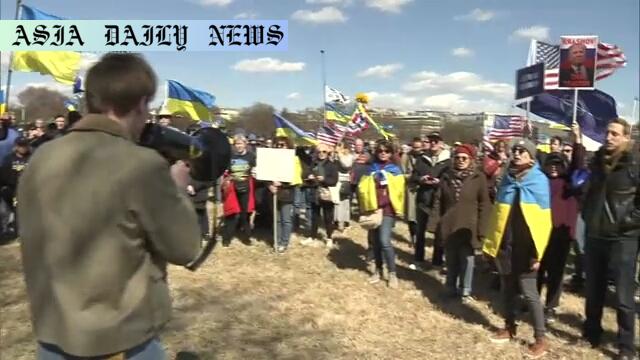Ukraine: Hundreds rallied in Washington, urging continued support amidst the suspension of US military aid by the Trump administration.
- A rally in Washington gathered hundreds of people calling for resumed US military aid to Ukraine.
- Participants displayed a massive Ukrainian flag and criticized Trump’s decision.
- The Ukrainian President noted upcoming high-level discussions in Saudi Arabia regarding the conflict.

Growing Advocacy for Ukraine Amidst Suspension of Military Aid
In a remarkable display of unity and resilience, hundreds of individuals gathered in Washington, D.C., to advocate for the resumption of United States military aid to Ukraine. The rally, held near the White House, underscored the growing concern among citizens regarding the American administration’s recent decision to suspend crucial support to Ukraine.
The suspension followed a contentious summit earlier this year between U.S. President Donald Trump and Ukrainian President Volodymyr Zelenskyy. The meeting, marked by heated exchanges, seemingly foreshadowed the eventual halt of military assistance, drawing criticism from various quarters—including political analysts and everyday citizens alike.
At the rally, participants displayed a 40-by-60-meter Ukrainian flag—a symbolic gesture of solidarity and hope. Organizers voiced the importance of standing by Ukraine, emphasizing the nation’s ongoing struggle amidst the geopolitical turmoil in Eastern Europe. Many attendees expressed deep concerns over how this shift in policy could potentially harm Ukraine amidst its active conflict zone.
Voices of Discontent: Citizens Express Their Concerns
Citizens came from various parts of the country to make their voices heard. Among them was a participant from Virginia, who emphasized how the administration’s actions were detrimental not only to Ukraine but also to America’s historical commitment to defending democracy and curbing authoritarian aggression. This sentiment was echoed by numerous attendees who viewed the suspension as a deviation from core American values.
Meanwhile, a Ukrainian-American participant emphasized the importance of military aid in withstanding external aggression. He expressed hope that the upcoming meetings in Saudi Arabia involving senior officials from the United States and Ukraine would bring a resolution to the impasse and make headway in addressing both countries’ enduring challenges. The overlapping concerns of citizens, immigrants, and advocates painted a complex picture of rising tensions yet unwavering hope for progress.
The Broader Implications of Resuming Military Aid
Beyond the immediate call for aid, the rally highlighted broader geopolitical and moral dimensions of America’s global role. Critics argue that suspending aid at this juncture not only undermines Ukraine’s ability to defend itself but also risks emboldening other nations that might take advantage of the United States’ perceived disengagement. Advocates at the rally stressed the need for steadiness in America’s international policies, noting how global trust and alliances could falter under wavering commitments.
Despite these concerns, hope remains as both governments prepare for future discussions. The meeting in Saudi Arabia is viewed as a critical platform to address the current gridlock and present new avenues for cooperation. Advocates for Ukraine believe that public pressure, alongside diplomatic negotiations, could tilt the scales in favor of resuming the much-needed support to the embattled nation.
The Role of Public Movements in Shaping Policy
The Washington rally marked another chapter in a series of public movements that have sought to hold political leaders accountable for their decisions. History has shown that citizen activism can influence significant policy shifts, particularly when the public voice aligns with the moral and strategic stance of a government. Advocacy for Ukraine taps into a shared concern among global citizens regarding democracy, sovereignty, and resistance to aggression.
As the events of the rally reverberate across political platforms, it serves as a reminder that individuals, when united by common goals, have the capacity to influence international relations. The coming weeks—especially the outcome of the Saudi Arabia meeting—will be critical in determining the future trajectory of U.S.-Ukraine relations and the global response to authoritarianism.



Commentary
The Power of Collective Action
The recent rally in Washington, D.C., serves as a testament to the power of collective action in addressing global issues. Standing up for Ukraine is more than just about advocating for a single nation; it is about reinforcing ideals of democracy, resilience, and unity in the face of adversity. The sight of individuals from different walks of life unfurling a massive Ukrainian flag near the White House is a poignant reminder that ordinary citizens can make a difference in influencing policies and shaping narratives.
The Importance of Sustained Support
As the United States grapples with decisions regarding its international commitments, it is essential to recognize the long-lasting impact of its choices. Ukraine’s situation is precarious, and diminishing military aid risks not only weakening its defense but also sending the wrong message to potential aggressors worldwide. Continued support from the United States aligns with its historical precedent of championing democracy and standing against unchecked tyranny.
Hope from Upcoming Discussions
The upcoming meeting in Saudi Arabia highlights a glimmer of hope amid the tension. If navigated thoughtfully, this platform could serve as an opportunity for both nations to resolve misunderstandings and reestablish pathways for cooperation. For advocates of Ukraine, this meeting represents a critical juncture—an opportunity to restore trust, reaffirm commitments, and pave the way for a united front against shared challenges.
Conclusion
The rally in Washington is a microcosm of a larger, global desire to preserve democratic values and support nations fighting for their sovereignty. While challenges remain, the determination of individuals, paired with diplomatic maneuvering, offers a pathway forward. As history has demonstrated time and again, public advocacy and policy change are not mutually exclusive but interconnected forces shaping the world we live in.